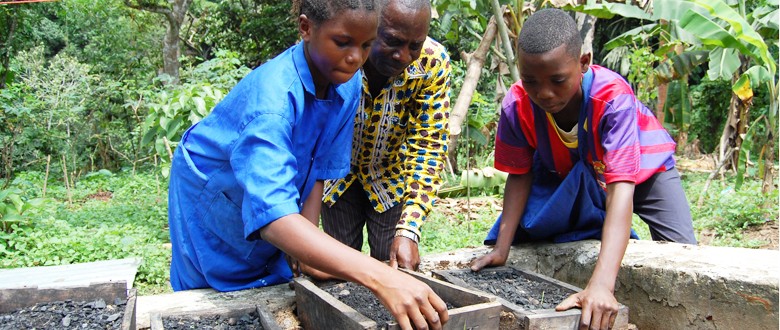
Equal treatment of men and women has been a fundamental tenet of VVOB since our inception and over the years achieving gender equity has become more and more central to our work around the world. Strong and effective partnerships have always been key. Nearly one year ago, VVOB and the Forum for African Women Educationalists (FAWE) signed a formal partnership agreement in order to strengthen our collaboration, benefiting school children in Africa. The partnership between VVOB and FAWE focuses on quality education and good learning outcomes for all learners. VVOB and FAWE have joined forces on topics such as gender-responsive pedagogy and school leadership, and gender-sensitive teaching and learning materials. The partnership also includes joint engagement at national, regional and international levels for gender-sensitive education policies and practices. In this article, we highlight some of the achievements of this strengthened cooperation between VVOB and FAWE.
Why focus on gender equity in education?
Gender inequality in education is both a cause and a consequence of deep-rooted disparities in society. VVOB recognises that offering quality education for girls and boys is both an intrinsic right and a critical lever to reaching other development objectives. Discriminatory education policies and practices still prevent millions of girls from completing and benefiting from quality education. Gender should therefore be integrated at all levels of education, from early childhood to higher education. This entails capacity development at all levels, from national policy makers and shapers to teachers and school leaders.
VVOB recognises that girls – and in some contexts boys - suffer severe disadvantages and exclusion in education systems. VVOB is committed to removing barriers and bottlenecks around gender disparities and discrimination in education, also and especially for the most marginalised children.
The gender perspective is therefore taken into account in the development, implementation and monitoring and evaluation of all VVOB’s projects and programmes – for example, through the use of gender mainstreaming techniques and specific gender equity measures. Building on FAWE’s experience and expertise, VVOB promotes the use of gender-responsive pedagogy in our work on teacher and school leadership development.
Gender-responsive pedagogy in DR Congo
VVOB promotes the gender-responsive pedagogy model designed by FAWE in its projects and programmes. Gender-responsive pedagogy equips teachers and school leaders with the knowledge, skills and attitudes enabling them to respond adequately to the learning needs of girls and boys. The gender-responsive pedagogy approach makes teachers more gender-aware by training them in gender-sensitive classroom processes and practices which result in equal participation of boys and girls in the classroom as well as in the community. The gender-responsive pedagogy model demonstrates how to transform teaching and learning processes to become gender-responsive in relation to lesson planning, teaching and learning materials, language use in the classroom, classroom set-up, classroom interaction and the role of school leadership in supporting gender-responsive pedagogical approaches in the school.
The promotion of the gender-responsive pedagogy model is already bearing fruit in DR Congo, for example, where VVOB and FAWE organised a sensitisation workshop on the importance of gender-responsive pedagogy. Officials of the National Training Service (Service National de Formation, SERNAFOR) and the Directorate of Curriculum and Learning Materials (Direction des Programmes Scolaires et Matériel Didactique, DIPROMAD) were trained on the importance of integrating gender equity in education services and materials. They were also provided with practical tools and guidance on how to actually implement their training. VVOB and FAWE have been working together in DR Congo on the contextualisation of the FAWE teacher’s guide on gender-responsive pedagogy in the specific context of agricultural technical schools. Teacher training on gender-responsive pedagogy was organised by VVOB and FAWE for agricultural technical schools. The partnership between VVOB and FAWE also led to the broadcasting of radio programmes on gender equity in education in three provinces. Additionally, an awareness movie on the importance of technical agricultural education explicitly includes the promotion of access and retention of girls in technical agricultural education.
Joint staff in Rwanda
Another benefit of the strengthened cooperation between VVOB and FAWE is the exchange of experience and joint learning. Within this framework of sharing and learning, VVOB and FAWE are exploring opportunities for staff exchange. One way of ensuring this is through joint staff positions. For example, a volunteer who has just been recruited in Rwanda will work for both FAWE and VVOB. This joint position in Rwanda will allow VVOB and FAWE to conduct research and write news articles for publication and distribution across the country and within the region. Research on gender equity in education will also be consolidated and analysed for use in advocacy work. Community sensitisation programmes for girls’ education and teacher training for Tuseme (“Speak out” clubs) will be supported. The volunteer will also be conducting interviews and writing articles by and about girls’ experience of Rwandan education for publications such as Voices of Rwandan Girls and the annual FAWE Rwanda News. The volunteer will also assist with ensuring gender-sensitivity of material development supported by VVOB. Monitoring and evaluation systems will be established to track the impact of advocacy and communication work.
Future plans
VVOB and FAWE are excited to celebrate our one year partnership on gender equity in education. Both organisations are looking forward to additional future cooperation. In 2016, the partnership will focus on joint activities in the DR Congo, Rwanda, Zambia and Zimbabwe in order to further strengthen our ties. VVOB Zimbabwe for instance will work closely with the Zimbabwe Chapter of FAWE (FAWEZI) in Colleges of Education on gender-sensitive material development.




